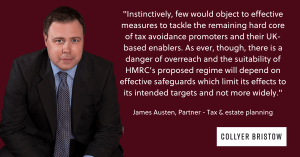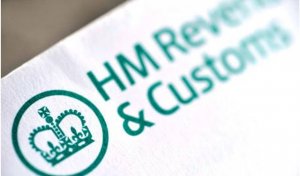- Tax disputes & investigations

Longer Reads
Foreign Assets Ruling Suggests New Tax Avoidance Approach
Supreme Court hands down decision in HMRC v Fisher on transfer of assets abroad regime. Partner James Austen comments.
4 minute read
Published 21 December 2023
Key information
- Specialisms
- Private Wealth
- Services
- Tax disputes & investigations
On Nov. 21, the U.K. Supreme Court handed down its decision in Commissioners for His Majesty’s Revenue & Customs v. Fisher on the scope of the U.K.’s transfer of assets abroad, or TOAA, tax code, finding unanimously for the taxpayers on every point.
For now, the overall effect of this decision is confirming that the scope of the TOAA code is significantly narrower than HM Revenue & Customs, or HMRC, had claimed, and it will hopefully provide much- needed clarity to taxpayers and their advisers in analogous situations in the future, as well as materially limit the application of the TOAA rules in similar cases.
As Justice Vivien Rose’s judgment notes at the outset, the TOAA rules are some of the most fiendishly complex in U.K. tax law, which — given the typical complexity of U.K. taxation — is a remarkable, if not dubious, achievement. It is perhaps not surprising then that the outcome of the appeals in this case has been different at every stage.
In another sign of the tax law’s complex nature, it has taken more than a decade for the Fisher case to be finally determined by the Supreme Court. It was first heard in early 2013 in the First-Tier Tribunal of Britain’s Tax Chamber, although the Upper Tribunal’s reference to the Court of Justice of the European Union did take several years.
As a former president of the Upper Tribunal, Tax and Chancery Chamber, and the only Supreme Court Justice with notable tax experience, Justice Rose gave the only reasoned decision, with which the other members of the court agreed.
What Justice Rose calls “the paradigm case” within the TOAA regime is “where an individual resident in the United Kingdom transfers assets … to a person overseas so that instead of that individual receiving and paying tax on income arising … the [transferee] either retains the income or transfers it to the individual in the form of capital.”
The intended effect of the TOAA rules is to tax the individual on the income arising to the non-U.K. transferee whether or not he or she receives it. Perhaps surprisingly, the rules date back to 1936, though they have become increasingly relevant as international travel, immigration and emigration, and tax planning, have become more widespread.
One of the main difficulties with the TOAA regime, as it has been operated by HMRC in recent years, is that the paradigm case nowhere near exhausts the circumstances in which the rules are applied against taxpayers.
The Supreme Court’s judgment was on two very narrow points:
- Whether an individual, or his or her spouse, had to be the transferor of assets overseas with the intention of avoiding U.K. tax; and
- Whether shareholders in a company could be treated as transferors when the company made the actual transfer.
The court decided the first question in the affirmative, and the second in the negative. As a result, the Fisher family escaped the imposition of tax charges under the TOAA regime with respect to the transfers to their Gibraltar company.
In that context, it was a relief that the draft Finance Bill legislation — which was published in parallel with the chancellor’s autumn statement on Nov. 22, 2023 — did not immediately seek to change the law to reverse the Supreme Court’s decision.
On occasion, the government is known to overturn adverse court decisions on tax points — sometimes even retrospectively — so that HMRC ultimately wins, even if it loses. This was done most recently in response to the leading child benefit charge case, Commissioners for Her Majesty’s Revenue and Customs v. Wilkes, in a judgment handed down by the Court of Appeal of England and Wales in December 2022.
In that case, the new retrospective legislation was controversially brought forward before the Court of Appeal had even determined the appeal. It remains to be seen whether the current or a future government will seek to displace the Supreme Court’s decision in Fisher in a later Finance Bill.
Justice Rose has confirmed that a shareholder in a company — even a majority shareholder — will not be a transferor in relation to a transfer by the company, even if they are also the company directors who decide to make the transfer. This is a welcome and much-needed clarification insofar as it goes, and it goes further than many tax commentators had predicted.
However, uncertainty remains as to the outer limits of who will be a quasi-transferor. Justice Rose said that a decision on that will have to await a future case to which it is relevant. While that might seem disappointing to some, it is actually good judicial practice to avoid deciding points that are not at issue before the court, and on which the outcome of the present case does not turn.
In what might turn out to be an important departure from the more typical recent judicial trend of construing tax provisions strictly against taxpayers to prevent avoidance, Justice Rose commented that the TOAA rules have both perplexed and concerned judges because they can be so punitive in operation, potentially subjecting innocent individuals to tax on amounts from which they may never benefit.
In a related move, Justice Rose was critical of HMRC’s general approach to the TOAA code. David Ewart KC’s argument that taxpayers’ uncertainty about whether or not the rules applied to them was positive, as it would disincentivize avoidance, received especially short shrift.
And, while Parliament is sovereign and can do practically anything it likes in legislation, the more punitive a law, the less likely the courts and tribunals are to construe it against taxpayers.
While not expressed in such terms, this approach is the result of the ancient principles that taxation requires certainty and that punitive measures must be especially certain. It might have been thought that those long-standing conventions were withering from lack of attention, but Justice Rose’s remarks may well give them a shot in the arm.
An exception to the requirement for certainty in tax legislation is, of course, the general anti-abuse rule, or GAAR, and similar principles-based tax legislation, in respect to which a certain functional ambiguity is inherent and unavoidable. At the time when the GAAR became law in 2013, some commentators objected to the uncertainties that would arise for taxpayers. But Parliament, cognizant of those issues, decided to pass it anyway.
Given that the GAAR now carries tax-geared penalties of up to 60% of the tax in issue, it remains to be seen how the tribunals and courts will seek to balance the principle of certainty and the rule against uncertain penalization with the overall scheme of the GAAR legislation in light of Justice Rose’s remarks in Fisher.
While this case was not about the so-called Ramsay anti-avoidance approach to construing tax laws — named after the leading 1982 House of Lords decision in Ramsay v. Inland Revenue Commissioners, which has been so important in defeating what judges consider to be unacceptable tax avoidance over the past 40 years — the tenor of the Supreme Court’s recent judgment leads one to wonder whether a high-water mark in judicial approaches to tax avoidance might possibly have been reached.
It remains to be seen how HMRC and HM Treasury will respond to the Fisher decision, and what effect the Supreme Court’s judgment will have on TOAA cases and tax legislation more broadly. HMRC will undoubtedly not have enjoyed the critical dissection of its approach to the TOAA regime. One hopes that it will moderate its attitude appropriately in future TOAA inquiries and appeals.
Irrespective of widespread rhetoric suggesting otherwise, it seems clear that the bad old days of rampant tax avoidance have been left behind, and so the need for wide-ranging and uncertain tax legislation is lessening, not increasing.
Even if the U.K.’s notoriously over-complex tax laws are not simplified so as to give clarity to taxpayers at a structural level, HMRC could go a long way to meet the same objective by adjusting its approach to ensure that it only ever acts within its powers and that their inquiries are reasonable and proportionate. That alone should help to stave off judicial criticism in the future.
This article was first published on 19 December 2023 by Law360 Magazine.
For more information, please visit our Tax disputes & investigations page.
Related content
Longer Reads
Foreign Assets Ruling Suggests New Tax Avoidance Approach
Supreme Court hands down decision in HMRC v Fisher on transfer of assets abroad regime. Partner James Austen comments.
Published 21 December 2023
Associated sectors / services
Authors
On Nov. 21, the U.K. Supreme Court handed down its decision in Commissioners for His Majesty’s Revenue & Customs v. Fisher on the scope of the U.K.’s transfer of assets abroad, or TOAA, tax code, finding unanimously for the taxpayers on every point.
For now, the overall effect of this decision is confirming that the scope of the TOAA code is significantly narrower than HM Revenue & Customs, or HMRC, had claimed, and it will hopefully provide much- needed clarity to taxpayers and their advisers in analogous situations in the future, as well as materially limit the application of the TOAA rules in similar cases.
As Justice Vivien Rose’s judgment notes at the outset, the TOAA rules are some of the most fiendishly complex in U.K. tax law, which — given the typical complexity of U.K. taxation — is a remarkable, if not dubious, achievement. It is perhaps not surprising then that the outcome of the appeals in this case has been different at every stage.
In another sign of the tax law’s complex nature, it has taken more than a decade for the Fisher case to be finally determined by the Supreme Court. It was first heard in early 2013 in the First-Tier Tribunal of Britain’s Tax Chamber, although the Upper Tribunal’s reference to the Court of Justice of the European Union did take several years.
As a former president of the Upper Tribunal, Tax and Chancery Chamber, and the only Supreme Court Justice with notable tax experience, Justice Rose gave the only reasoned decision, with which the other members of the court agreed.
What Justice Rose calls “the paradigm case” within the TOAA regime is “where an individual resident in the United Kingdom transfers assets … to a person overseas so that instead of that individual receiving and paying tax on income arising … the [transferee] either retains the income or transfers it to the individual in the form of capital.”
The intended effect of the TOAA rules is to tax the individual on the income arising to the non-U.K. transferee whether or not he or she receives it. Perhaps surprisingly, the rules date back to 1936, though they have become increasingly relevant as international travel, immigration and emigration, and tax planning, have become more widespread.
One of the main difficulties with the TOAA regime, as it has been operated by HMRC in recent years, is that the paradigm case nowhere near exhausts the circumstances in which the rules are applied against taxpayers.
The Supreme Court’s judgment was on two very narrow points:
- Whether an individual, or his or her spouse, had to be the transferor of assets overseas with the intention of avoiding U.K. tax; and
- Whether shareholders in a company could be treated as transferors when the company made the actual transfer.
The court decided the first question in the affirmative, and the second in the negative. As a result, the Fisher family escaped the imposition of tax charges under the TOAA regime with respect to the transfers to their Gibraltar company.
In that context, it was a relief that the draft Finance Bill legislation — which was published in parallel with the chancellor’s autumn statement on Nov. 22, 2023 — did not immediately seek to change the law to reverse the Supreme Court’s decision.
On occasion, the government is known to overturn adverse court decisions on tax points — sometimes even retrospectively — so that HMRC ultimately wins, even if it loses. This was done most recently in response to the leading child benefit charge case, Commissioners for Her Majesty’s Revenue and Customs v. Wilkes, in a judgment handed down by the Court of Appeal of England and Wales in December 2022.
In that case, the new retrospective legislation was controversially brought forward before the Court of Appeal had even determined the appeal. It remains to be seen whether the current or a future government will seek to displace the Supreme Court’s decision in Fisher in a later Finance Bill.
Justice Rose has confirmed that a shareholder in a company — even a majority shareholder — will not be a transferor in relation to a transfer by the company, even if they are also the company directors who decide to make the transfer. This is a welcome and much-needed clarification insofar as it goes, and it goes further than many tax commentators had predicted.
However, uncertainty remains as to the outer limits of who will be a quasi-transferor. Justice Rose said that a decision on that will have to await a future case to which it is relevant. While that might seem disappointing to some, it is actually good judicial practice to avoid deciding points that are not at issue before the court, and on which the outcome of the present case does not turn.
In what might turn out to be an important departure from the more typical recent judicial trend of construing tax provisions strictly against taxpayers to prevent avoidance, Justice Rose commented that the TOAA rules have both perplexed and concerned judges because they can be so punitive in operation, potentially subjecting innocent individuals to tax on amounts from which they may never benefit.
In a related move, Justice Rose was critical of HMRC’s general approach to the TOAA code. David Ewart KC’s argument that taxpayers’ uncertainty about whether or not the rules applied to them was positive, as it would disincentivize avoidance, received especially short shrift.
And, while Parliament is sovereign and can do practically anything it likes in legislation, the more punitive a law, the less likely the courts and tribunals are to construe it against taxpayers.
While not expressed in such terms, this approach is the result of the ancient principles that taxation requires certainty and that punitive measures must be especially certain. It might have been thought that those long-standing conventions were withering from lack of attention, but Justice Rose’s remarks may well give them a shot in the arm.
An exception to the requirement for certainty in tax legislation is, of course, the general anti-abuse rule, or GAAR, and similar principles-based tax legislation, in respect to which a certain functional ambiguity is inherent and unavoidable. At the time when the GAAR became law in 2013, some commentators objected to the uncertainties that would arise for taxpayers. But Parliament, cognizant of those issues, decided to pass it anyway.
Given that the GAAR now carries tax-geared penalties of up to 60% of the tax in issue, it remains to be seen how the tribunals and courts will seek to balance the principle of certainty and the rule against uncertain penalization with the overall scheme of the GAAR legislation in light of Justice Rose’s remarks in Fisher.
While this case was not about the so-called Ramsay anti-avoidance approach to construing tax laws — named after the leading 1982 House of Lords decision in Ramsay v. Inland Revenue Commissioners, which has been so important in defeating what judges consider to be unacceptable tax avoidance over the past 40 years — the tenor of the Supreme Court’s recent judgment leads one to wonder whether a high-water mark in judicial approaches to tax avoidance might possibly have been reached.
It remains to be seen how HMRC and HM Treasury will respond to the Fisher decision, and what effect the Supreme Court’s judgment will have on TOAA cases and tax legislation more broadly. HMRC will undoubtedly not have enjoyed the critical dissection of its approach to the TOAA regime. One hopes that it will moderate its attitude appropriately in future TOAA inquiries and appeals.
Irrespective of widespread rhetoric suggesting otherwise, it seems clear that the bad old days of rampant tax avoidance have been left behind, and so the need for wide-ranging and uncertain tax legislation is lessening, not increasing.
Even if the U.K.’s notoriously over-complex tax laws are not simplified so as to give clarity to taxpayers at a structural level, HMRC could go a long way to meet the same objective by adjusting its approach to ensure that it only ever acts within its powers and that their inquiries are reasonable and proportionate. That alone should help to stave off judicial criticism in the future.
This article was first published on 19 December 2023 by Law360 Magazine.
For more information, please visit our Tax disputes & investigations page.
Associated sectors / services
- Tax disputes & investigations
Authors
Need some more information? Make an enquiry below.
Subscribe
Please add your details and your areas of interest below
Article contributor
James
AustenPartner
Specialising in UK trusts, tax & estate planning, Private wealth, Tax disputes & investigations and Trusts & Inheritance disputes
Enjoy reading our articles? why not subscribe to notifications so you’ll never miss one?
Subscribe to our articlesMessage us on WhatsApp (calling not available)
Please note that Collyer Bristow provides this service during office hours for general information and enquiries only and that no legal or other professional advice will be provided over the WhatsApp platform. Please also note that if you choose to use this platform your personal data is likely to be processed outside the UK and EEA, including in the US. Appropriate legal or other professional opinion should be taken before taking or omitting to take any action in respect of any specific problem. Collyer Bristow LLP accepts no liability for any loss or damage which may arise from reliance on information provided. All information will be deleted immediately upon completion of a conversation.
Close










































